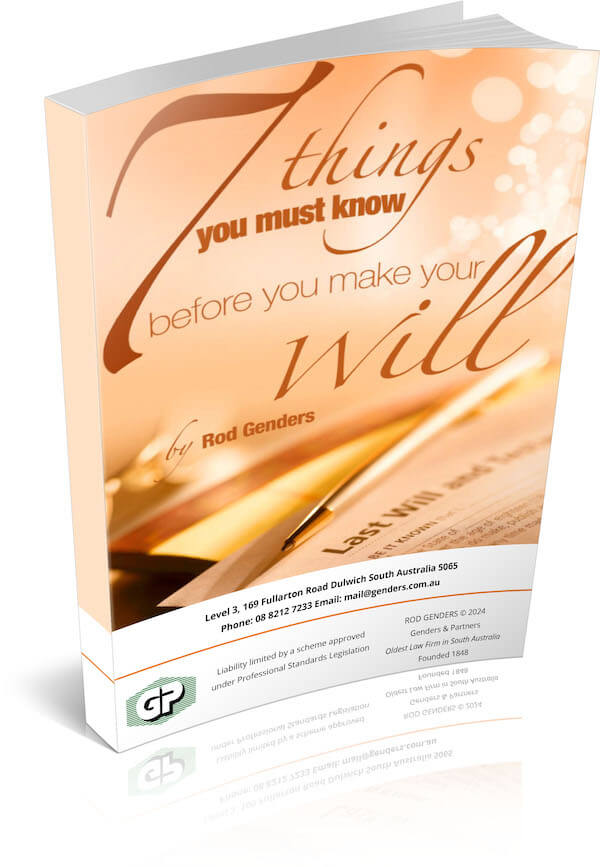
When you can’t make important decisions for yourself regarding accommodation, lifestyle, health or medical treatment, an Advance Care Directive is the shining beacon that guides your family and doctors in the right direction.
The Components of an Advance Care Directive
An Advance Care Directive (ACD) is a legally-binding document that directs how you would like to be treated if you cannot express your wishes, and is made up of three parts:
- Naming one or more trusted Substitute Decision Makers, who can advocate for your care when you may not be able to do so for yourself; and/or
- Creating a set of guidance notes (sometimes called a ‘Living Will’), stating the types of care and medical treatments you do and do not want at the end of your life; and/or
- Making a Do Not Resuscitate (DNR) command for use in certain specific circumstances at the end of your life.
Choose a Substitute Decision Maker
Previously known as a Medical Power of Attorney or Enduring Guardian, this person can make health and other personal decisions on your behalf should you no longer be able to do so.
These decisions relate to your accommodation, lifestyle, health care and medical treatment.
For example: which nursing home should you live-in; who will your carers be; etc
Decisions a Substitute Decision Maker can Make
- Choices about medical care, including medical tests, medicine, or surgery;
- The right to request or decline life-support treatments;
- Choices about pain management, including authorisation or refusal of medication or procedures;
- Admission to an assisted living facility, hospital, hospice, or nursing home;
- Choices about where to seek medical treatment, including the right to move you to another facility, hospital, or state;
- The right to see and approve release of your medical records;
- The option to take legal action on your behalf in order to advocate for your health care rights and wishes;
- The right to apply for Medicare, Centrelink, or other programs or insurance benefits on your behalf.
- It is important to note that some decisions that relate to your legal or financial affairs may require an additional separate document known as an Enduring Power of Attorney.
An ACD permits you to write-down your wishes ahead of time – in anticipation of finding yourself in a situation later in life when you might not be able to express your wishes.
The doctors use this as a guide to manage your care, and your Substitute Decision Maker uses it to make sure what you want is being fulfilled.
This lets you choose the types of medical treatments you want, and the types you don’t want.
DNR = Do Not Resuscitate
A Do Not Resuscitate (DNR) command allows you to refuse being brought back to life if your heart or breathing stops.
It is typically only in precisely-defined circumstances (ie not if you go to hospital with the flu or a broken toe!) Typically a DNR command would be confined to situations where you were in the terminal phase of a terminal disease; or in a persistent vegetative state.
Usually there would be a condition specified that 2 or more medical practitioners agree that you had no hope of recovery.
A DNR focuses on life-support treatments and medical procedures, devices, or medications to keep you alive when your body might not be able to keep itself alive on its own.
If you’re suffering from a terminal or progressive illness, if you’re ill and unlikely to recover, or if you’re in a coma (persistent vegetative state).
When does a DNR go into effect?
A DNR only applies in situations where the patient’s heart or breathing has stopped. Even with a DNR, a patient may still receive medical treatments, medicines, surgeries, and procedures.
For example, a patient with Stage IV Lung Cancer might not wish to be resuscitated when they die, but they would want palliative care and analgesic medication.
Why You Need an ACD
It appoints someone you trust to make decisions for you when you cannot do so for yourself.
It lets family and caregivers know the types of treatments you want and don’t want, the way you would like to be cared for as you age, and who should make decisions for you if you can’t make decisions for yourself.
Most importantly, it can include a DNR which takes an enormous amount of stress off your family, since they won’t have to make this agonisingly difficult decision about your end-of-life care.
When an ACD goes into effect
An ACD is only used if you are deemed partly or fully incapacitated and incompetent by at least one doctor.
If you are only temporarily incapacitated, as in a situation where you may not be able to speak but you are likely to recover, it won’t go into permanent effect.
So long as you are mentally competent and can speak or communicate on your own behalf, it won’t be used if you don’t want it to be.
To put it another way – if you retain your capacity, you will be able to revoke or revise your ACD to prevent it being used when you don’t want it to be used.
How to Create an ACD
Each person must create his or her own ACD; no one can create one on behalf of another person. In addition, a person who creates one must be of sound mind in order for it to be legally valid and effective.
The correct form must be used, and it must be completed and witnessed in the required manner.
Most people prefer to have the assistance of a lawyer who specialises in estate planning to complete their ACD as part of their modern integrated estate plan.
This ensures that no hidden error occur which might only come to light in an emergency situation – when it is too late to fix them.
For more information on Advance Care Directives and creating a modern integrated estate plan to guard against incapacity issues, or other estate planning topics, contact the oldest law firm in South Australia – Genders and Partners (established 1848) to explore our articles and visit our website today to schedule your free consultation!
SPECIAL REPORT “7 Things You Must Know Before You Make Your Will”
In this report you will Learn:

Why home-made Wills can be a LOT more expensive than you might think.
The secret weapons used by the rich & powerful to protect their assets, and transfer their wealth two or three generations ahead.
How Estate and Trustee Companies make BIG money from “free” Wills.
The Most Common Estate Planning Mistakes, how they can cost your family a fortune, and How to Avoid Them.
The Elements of a Sound Estate Plan – why a Will alone is not enough.
How to Make Sure Your Assets Stay in Your Family and are not lost to creditors, lawsuits or ex-spouses.
How to guard against challenges to your Estate after you’re gone.







